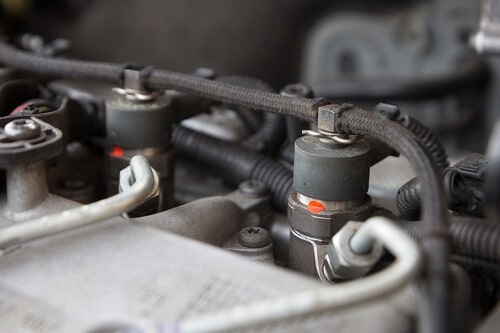Your Guide to Automotive Fuel Injection Systems
When automakers switched from carburetors to fuel injection systems, they greatly improved the fuel efficiency of all their vehicles. With that move, you now get to keep more money in your pocket as your car, truck, or van sips much less gas on all your travels. But these systems can only work at peak efficiency if they’re kept in good condition with regular maintenance services. Thankfully, it’s easy to make that happen by partnering with your Canton auto repair team. Here’s what you need to know:

What is Fuel Injection?
Fuel injection is a gasoline or diesel delivery system that takes fuel from the gas tank and sends it into the engine’s combustion chambers. Depending on its overall design, the system is triggered to activate through mechanical processes or electrical signals.
The parts in the fuel injection system vary according to your car’s year, model, and engine type, but may include:
- Fuel pump
- Filter
- Pressure regulator
- Fuel distributor
- Fuel rail
- Injectors
- Lines
As the fuel is delivered through and by these components, it’s metered out to create the ideal air/fuel ratio your engine needs to run properly.
Types of Fuel Injection Systems
Modern gasoline vehicles use either direct or indirect electronic fuel injection systems to deliver air and fuel to the combustion chambers. Prior to those advancements, cars used a basic mechanical fuel injection system.
This early system determined how much fuel to send by monitoring the flap valve on the air intake. As the airflow increased, the flap lifted and the fuel distributor sent more gasoline flooding into the engine. Although this was an improvement over carbureted systems, it still wasted a lot of gas.
Indirect electronic fuel injection delivers fuel in timed bursts that occur only during the induction stroke. This keeps fuel out of the cylinder until it’s needed, wasting far less fuel than before. Since the injectors send fuel through the head, not the block, there’s still a bit of waste with this system.
To resolve that problem, carmakers rolled out direct fuel injection. This system puts the injectors at just the right spot to deliver fuel directly to the cylinders. The result is improved fuel efficiency and more torque without increasing the engine size. Unfortunately, since the fuel doesn’t flow through the head, carbon can build up there, resulting in the need for service.
What to Expect During Fuel System Service
No matter what type of fuel injection system your vehicle has, it requires basic maintenance service every 60,000 to 90,000 miles to stay in great condition. During that service appointment, your technician will perform the following steps:
- Check the fuel pump pressure and volume to see if it’s in spec
- Inspect all of the components for signs of wear or damage
- Flush out the fuel injectors, rail, and other components
- Clean out all the air passageways and throttle valve
Once they’re done cleaning the system, they will look at the computer to verify that it’s using the right air/fuel ratio. Then, they will finish up by checking the function of all the associated sensors.
Check out this video from BG Services explaining the Fuel Injection System.
Ready to Maintain Your Fuel Injection System? We Can Help
If you’d like to keep your fuel injection system running right, all you have to do is give our team a call today. At Collinsville Auto Repair, we know just when and how to service all the systems in your vehicle to keep it running at peak efficiency. So, give us a call at 860-693-4588 to learn if fuel injection service and repair is due and get your vehicle on our schedule.
